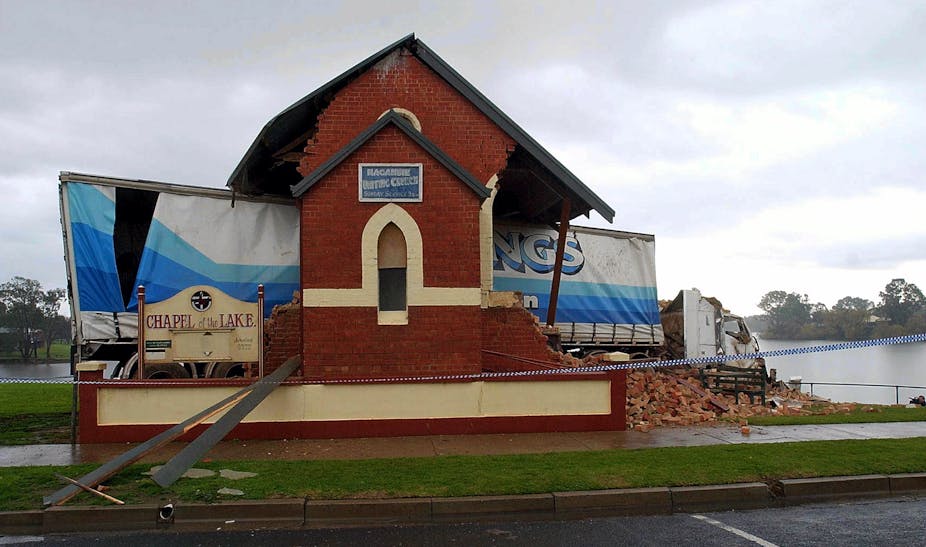Some religious groups are feeling under attack. They claim their “freedom of religion” is being impaired. For example, federal Attorney-General George Brandis, speaking to the Law School of Notre Dame University, attacked Fairfax Media and the ABC for alleged prejudice against religion in their reporting particularly of clergy abuse of children. I have heard similar complaints from Christian groups as disparate as Catch the Fire Ministries, Catholics and Presbyterians.
The issue comes down to freedom on the one hand and, on the other, standards of transparency and accountability to which all organisations are being held today. “Trust me, I am a ……” is no longer acceptable, nor is “Obey me, I am a ……”
In a funny way, in this respect churches are like trucking companies, a comparison Cardinal George Pell made recently at the royal commission into institutional abuse. Both are accountable and neither likes it when the harsh light of accountability is shone upon them.
However, being “religious” is no excuse nor does it provide a shelter from examination. Ironically, the very standards of openness, responsibility and accountability by which religious groups are being judged have their roots in, among other places, religious ethics. Religious figures who have been ready to judge others find it uncomfortable to be judged themselves, by their own standards.
Religion has lost its special status
I can understand how difficult it is and will be for some organisations that had long considered themselves “special” to accept that they are accountable to others and to the society in which they operate. The objection by some religious charities to the not-for-profit (NFP) regulatory regime instituted recently is another example.
Most NFP organisations have been quite happy with the regulations. These turned out not to be onerous, but did require accountability, including that money collected for tax-deductible purposes be spent for those purposes and not siphoned off to other activities.
While some may feel that this insistence on accountability is a deliberate attack, it is more the result of cultural change. Cultures that once accorded a special status to religion and religious leaders have changed and no longer do so. In part this has been a reaction to the excesses of some religious leaders, but it is more a product of cultural changes promoting equality, dignity for all and the removal of the protective veil from once “special” groups, professions and organisations.
The International Covenant on Civil and Political Rights (ICCPR) states in Article 18, paragraph 1, that:
Everyone shall have the right to freedom of thought, conscience and religion. This right shall include freedom to have or to adopt a religion or belief of his choice, and freedom, either individually or in community with others and in public or private, to manifest his religion or belief in worship, observance, practice and teaching.
This right like the other rights declared in the ICCPR stems from the dignity of the human person and is held in tension with the rights of others and of other rights. Article 18, paragraph 3 states:
Freedom to manifest one’s religion or beliefs may be subject only to such limitations as are prescribed by law and are necessary to protect public safety, order, health, or morals or the fundamental rights and freedoms of others.
Balancing religious and non-religious rights
The ICCPR does not promulgate a hierarchy of rights with some more inviolable than others. However, the discourse about religious rights often begins to sound like these rights are pre-eminent and not subject to the laws of the land, let alone the rights of others - as the author and others explained in a 2011 research report to the Australian Human Rights Commission.
The challenge facing Australia today is how to balance and negotiate the rights of the religious and those who have no religion. The right to have a religion and to practise it – including allowing it to shape the way one lives – is protected. But if one delivers a service to the public, the fact that one’s beliefs may limit what is provided must at least be made clear.
For example, regulations regarding the provision of and referral for abortions are being tested in the Victorian courts. Matters become more complex when a religious organisation receives government funding to provide a service, but claims to be limited by belief from delivering the service to some citizens of the society.
These issues are complex. It is unhelpful to claim attack when there is none, but what is experienced is in most cases the consequence of social and cultural change. What was once “cultural” has become counter-cultural.

